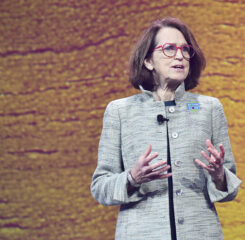Bringing a Culture of Courtesy to Your Community
Not long after it completed a major campus expansion in June 2012, leaders at Oklahoma Methodist Manor in Tulsa, OK, noticed that something was out of order.
The expansion had added 103 apartments to the life plan community, effectively doubling its independent living population in the span of 1 year. And with that change had come some unexpected challenges.
“The new construction created a sense of hope and possibility for the future that was powerful,” says Chief Executive Officer Steve Dickie. “But it was still change, and you still have to manage that change, because nobody likes change.”
Within a few years, several incidences involving interpersonal conflict, both blatant and surreptitious, caught Dickie’s attention. Basically, some residents were not treating other residents, or the organization’s team members, as kindly as they might. Dickie worried that this trend, if left unaddressed, could threaten the unique sense of community that Oklahoma Methodist Manor had worked so hard to develop over its 60-year history.
The Methodist Manor management team did its best to address each incident in a direct and transparent manner. But Dickie remained on the lookout for strategies that could educate and inspire every member of the Methodist Manor community to do better.
Dickie found that strategy in 2015, when Kay Collier McLaughlin, a leadership development specialist for the Episcopal Church, came to campus. During a daylong Leadership Development Summit, McLaughlin helped 61 residents, board members, and staff members develop “Culture of Courtesy Guidelines” that have since become the framework for interpersonal relations at the community.
“I would put this document on the same level as our mission vision and values statement,” says Dickie.
Culture of Courtesy Guidelines
The 1-page guidelines begin by outlining 2 overarching goals that residents and staff members at Oklahoma Methodist Manor should work toward: respecting other perspectives, and engaging in dialogue, not debate.
“If others have different perspectives from ours, we will listen respectfully, honoring their truth as we expect ours to be honored,” the guidelines promise.
Next, the guidelines present several steps community members should take to improve the quality of their interactions with others, including:
- Speak only for myself, using “I” messages.
- Take responsibility for my own thoughts and feelings.
- Remember the promise to respect the dignity of every human being.
- Seek and acknowledge common ground.
- Honor confidentiality unless permission to share is explicitly given.
- Practice sacred listening by listening for God in the experience of others, accepting experiences as valid and true for the speaker, searching for strengths in the experiences of others, and allowing each person to speak before one speaks again.
- Make sure that a person is present when he or she is being discussed.
8 Detrimental Behaviors
Finally, the guidelines identify 8 behaviors “that are so detrimental to healthy community life that we are committed to helping each other eliminate them.” They are:
Triangulating, or indirect communication. “We will prevent triangulating by asking others to go to source, offering to go along, authenticating data, and presenting facts,” read the guidelines.
Distancing, which involves pushing away or being disengaged. “We will avoid distancing by … choosing civility, treating each other as adults, checking in and on each other, and welcoming while respecting people’s choice not to participate.”
Conflict. “We will avoid conflict by seeking help with mediation, and revealing data.”
Over-Functioning, which involves doing too much or thinking you are the only one who can carry out tasks. “We will stop over-functioning by increasing self-awareness and actively recruiting and involving others.”
Under-Functioning, which involves doing nothing or shutting down. “We will inhibit under-functioning by noting the talents of each community member and using those talents for the greater good.”
Sabotage, which involves setting someone up to fail, being secretive, and using covert means. “We will foil sabotage by getting issues out in open and strengthening the strong to be strong.”
Cutting-off, or leaving a situation with no chance of conversation, healing, or reconciliation. “We will impede cutting-off by being available without pursuing, and living out our commitment to reconciliation.”
Bullying, which can be physical, verbal, or emotional. “We will block bullying by identifying it when it occurs and refusing to accept it for ourselves or the group.”
Ownership Leads to Action
Participants left the 2013 leadership summit with a sense that they owned the framework they had helped create, says Dickie. That sense of ownership has turned the guidelines into a living document that directs the interactions of residents and staff, and has even influenced how the organization addresses potentially contentious issues.
“The hardest board meeting of the year is the board meeting where a decision is made about what the fees are going to be for the next year, and the hardest letter that we send is the fee increase letter,” says Dickie. “So how do we handle that? Do we distance ourselves? Do we just avoid this uncomfortable topic? No.”
Inspired by the Culture of Courtesy Guidelines, Chief Financial Officer Scott Morgan makes a presentation at the organization’s monthly Town Hall meeting. He communicates the facts: why there is a fee increase, what the fee increase is, and how the decision for the fee increase is made.
“At the end of the meeting, we have successfully avoided the detrimental behavior of sabotage,” says Dickie. “We get all of the issues out in the open. This courtesy, this mutual respect in our community, works as intended.”
Courtesy: A Valuable Asset
Focusing on building a culture of courtesy may seem like a frivolous extravagance when the average consumer seems more interested in floor plans and amenities, says Dickie. But don’t underestimate the role that an organization’s culture can play in attracting residents and making them feel at home.
“The decision to move to a senior living community is not a real estate decision,” he says. “It is a decision about the sense of belonging that I want to have with a group of other people. The strong sense of community at Methodist Manor is what makes us unique. It is the real reason people move here. So, we have a very strong motivation to preserve and protect that sense of community in any way we can.”
Not long after it completed a major campus expansion in June 2012, leaders at Oklahoma Methodist Manor in Tulsa, OK, noticed that something was out of order.
The expansion had added 103 apartments to the life plan community, effectively doubling its independent living population in the span of 1 year. And with that change had come some unexpected challenges.
“The new construction created a sense of hope and possibility for the future that was powerful,” says Chief Executive Officer Steve Dickie. “But it was still change, and you still have to manage that change, because nobody likes change.”
Within a few years, several incidences involving interpersonal conflict, both blatant and surreptitious, caught Dickie’s attention. Basically, some residents were not treating other residents, or the organization’s team members, as kindly as they might. Dickie worried that this trend, if left unaddressed, could threaten the unique sense of community that Oklahoma Methodist Manor had worked so hard to develop over its 60-year history.
The Methodist Manor management team did its best to address each incident in a direct and transparent manner. But Dickie remained on the lookout for strategies that could educate and inspire every member of the Methodist Manor community to do better.
Dickie found that strategy in 2015, when Kay Collier McLaughlin, a leadership development specialist for the Episcopal Church, came to campus. During a daylong Leadership Development Summit, McLaughlin helped 61 residents, board members, and staff members develop “Culture of Courtesy Guidelines” that have since become the framework for interpersonal relations at the community.
“I would put this document on the same level as our mission vision and values statement,” says Dickie.
Culture of Courtesy Guidelines
The 1-page guidelines begin by outlining 2 overarching goals that residents and staff members at Oklahoma Methodist Manor should work toward: respecting other perspectives, and engaging in dialogue, not debate.
“If others have different perspectives from ours, we will listen respectfully, honoring their truth as we expect ours to be honored,” the guidelines promise.
Next, the guidelines present several steps community members should take to improve the quality of their interactions with others, including:
- Speak only for myself, using “I” messages.
- Take responsibility for my own thoughts and feelings.
- Remember the promise to respect the dignity of every human being.
- Seek and acknowledge common ground.
- Honor confidentiality unless permission to share is explicitly given.
- Practice sacred listening by listening for God in the experience of others, accepting experiences as valid and true for the speaker, searching for strengths in the experiences of others, and allowing each person to speak before one speaks again.
- Make sure that a person is present when he or she is being discussed.
8 Detrimental Behaviors
Finally, the guidelines identify 8 behaviors “that are so detrimental to healthy community life that we are committed to helping each other eliminate them.” They are:
Triangulating, or indirect communication. “We will prevent triangulating by asking others to go to source, offering to go along, authenticating data, and presenting facts,” read the guidelines.
Distancing, which involves pushing away or being disengaged. “We will avoid distancing by … choosing civility, treating each other as adults, checking in and on each other, and welcoming while respecting people’s choice not to participate.”
Conflict. “We will avoid conflict by seeking help with mediation, and revealing data.”
Over-Functioning, which involves doing too much or thinking you are the only one who can carry out tasks. “We will stop over-functioning by increasing self-awareness and actively recruiting and involving others.”
Under-Functioning, which involves doing nothing or shutting down. “We will inhibit under-functioning by noting the talents of each community member and using those talents for the greater good.”
Sabotage, which involves setting someone up to fail, being secretive, and using covert means. “We will foil sabotage by getting issues out in open and strengthening the strong to be strong.”
Cutting-off, or leaving a situation with no chance of conversation, healing, or reconciliation. “We will impede cutting-off by being available without pursuing, and living out our commitment to reconciliation.”
Bullying, which can be physical, verbal, or emotional. “We will block bullying by identifying it when it occurs and refusing to accept it for ourselves or the group.”
Ownership Leads to Action
Participants left the 2013 leadership summit with a sense that they owned the framework they had helped create, says Dickie. That sense of ownership has turned the guidelines into a living document that directs the interactions of residents and staff, and has even influenced how the organization addresses potentially contentious issues.
“The hardest board meeting of the year is the board meeting where a decision is made about what the fees are going to be for the next year, and the hardest letter that we send is the fee increase letter,” says Dickie. “So how do we handle that? Do we distance ourselves? Do we just avoid this uncomfortable topic? No.”
Inspired by the Culture of Courtesy Guidelines, Chief Financial Officer Scott Morgan makes a presentation at the organization’s monthly Town Hall meeting. He communicates the facts: why there is a fee increase, what the fee increase is, and how the decision for the fee increase is made.
“At the end of the meeting, we have successfully avoided the detrimental behavior of sabotage,” says Dickie. “We get all of the issues out in the open. This courtesy, this mutual respect in our community, works as intended.”
Courtesy: A Valuable Asset
Focusing on building a culture of courtesy may seem like a frivolous extravagance when the average consumer seems more interested in floor plans and amenities, says Dickie. But don’t underestimate the role that an organization’s culture can play in attracting residents and making them feel at home.
“The decision to move to a senior living community is not a real estate decision,” he says. “It is a decision about the sense of belonging that I want to have with a group of other people. The strong sense of community at Methodist Manor is what makes us unique. It is the real reason people move here. So, we have a very strong motivation to preserve and protect that sense of community in any way we can.”

Most Recommended
November 08, 2024
 HOTMA: New Rules for Housing
HOTMA: New Rules for Housing
November 06, 2024
 Colleagues on the Move, November 6, 2024
Colleagues on the Move, November 6, 2024
November 06, 2024
 Analysis: What Does the Final CY2025 Home Health Rule Include?
Analysis: What Does the Final CY2025 Home Health Rule Include?
October 29, 2024
Katie Smith Sloan Urges Members to Build a Movement, Take Action
Recently Added
December 10, 2024
4 Top Tech Themes from 2024
December 09, 2024
 Analysis: What’s Changing with the Home Health CAHPS Survey?
Analysis: What’s Changing with the Home Health CAHPS Survey?
December 09, 2024



